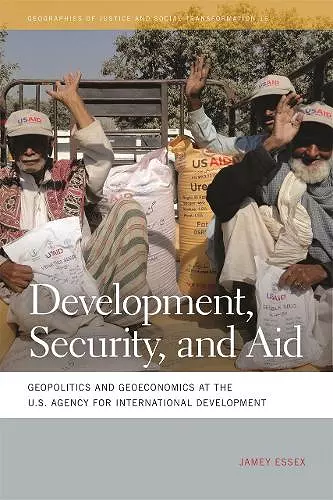Development, Security, and Aid
Geopolitics and Geoeconomics at the U.S. Agency for International Development
Format:Hardback
Publisher:University of Georgia Press
Published:1st Mar '13
Currently unavailable, and unfortunately no date known when it will be back

In Development, Security, and Aid Jamey Essex offers a sophisticated study of the U.S. Agency for International Development (USAID), examining the separate but intertwined discourses of geopolitics and geoeconomics.
Geopolitics concentrates on territory, borders, and strategic political and military positioning within the international state system. Geoeconomics emphasizes economic power, growth, and connectedness within a global, and supposedly borderless, system. Both discourses have strongly influenced the strategies of USAID and the views of American policy makers, bureaucrats, and business leaders toward international development. Providing a unique geographical analysis of American development policy, Essex details USAID's establishment in 1961 and traces the agency's growth from the Cold War into an era of neoliberal globalization up to and beyond 9/11, the global war on terror, and the looming age of austerity.
USAID promotes improvement for millions by providing emergency assistance and support for long-term economic and social development. Yet the agency's humanitarian efforts are strongly influenced, and often trumped, by its mandate to advance American foreign policies. As a site of, a strategy for, and an agent in the making of geopolitics and geoeconomics, USAID, Essex argues, has often struggled to reconcile its many institutional mandates and objectives. The agency has always occupied a precarious political position, one that is increasingly marked by the strong influence of military, corporate, and foreign-policy institutions in American development strategy.
Using the insights developed in recent work in critical geopolitics, this volume carefully reassesses the policy discourses and practical policies of USAID, showing how the larger canvass of geopolitics worked its way into American development funding and management. From the Marshall Plan through neoliberalism to contemporary concerns with fragile states, this very well-written volume traces the shifting geopolitical priorities of aid policy in its attempts to shape the world in line with American priorities.
* author of Security and Environmental Change *An incisive and fresh treatment of the politics of U .S. development assistance. Essex's bold and original analysis shows how USAID is caught up in broader questions of geopolitics and geoeconomics. Inspired by a critical geographical imagination, this marvelous book will be compelling reading for anyone who cares about development, international political economy, and U.S. foreign policy.
* University of KentucISBN: 9780820342474
Dimensions: 229mm x 152mm x 16mm
Weight: 454g
208 pages